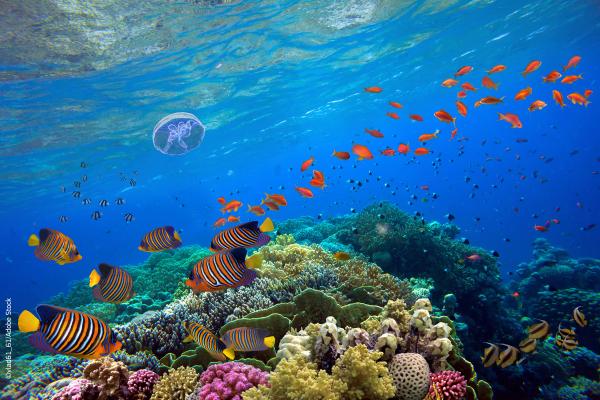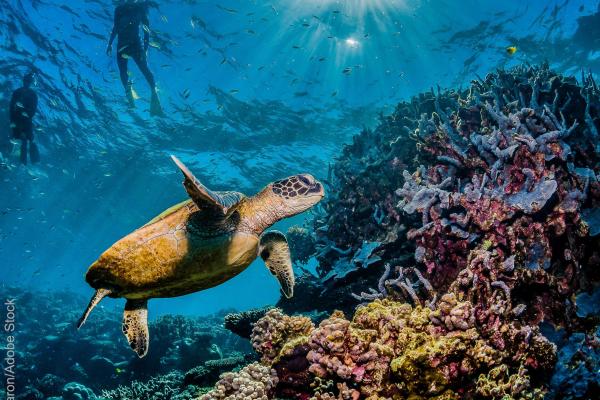The agreement under the United Nations Convention on the Law of the Sea on the conservation and sustainable use of marine biological diversity of areas beyond national jurisdiction (BBNJ Agreement), also known as the “Treaty of the High Seas”, is key to:
- protect the ocean
- promote equity and fairness
- tackle environmental degradation
- fight climate change
- prevent biodiversity loss in the high seas
The BBNJ Agreement was in the making for more than a decade under the auspices of the United Nations (UN). In March 2023, international negotiations were successfully concluded and on 19 June 2023 the Agreement was adopted by consensus at the 5th BBNJ Intergovernmental Conference in New York.
On 20 September 2023 the President of the European Commission, Ursula von der Leyen, signed the BBNJ Agreement on behalf of the EU.
On 12 October 2023 the European Commission submitted a proposal to the Council of the EU to approve the conclusion of the BBNJ Agreement on behalf of the EU, which will also require the consent of the European Parliament.
The BBNJ Agreement has been a priority for the European Union and its Member States, that have led negotiations at global level through the BBNJ High Ambition Coalition (see below the list of countries in the coalition). This landmark agreement is a welcome addition to the United Nations Convention on the Law of the Sea (UNCLOS), which provides the legal framework within which all activities in the oceans and seas must be carried out.
What the BBNJ Agreement will bring – in a nutshell
The BBNJ Agreement:
- Sets up a procedure to establish large-scale marine protected areas in the high seas. This facilitates the achievement of the target to effectively conserve and manage 30% of land and sea by 2030, which was agreed in December 2022 within the Kunming-Montreal Global Biodiversity Framework.
- Establishes the sharing of benefits from marine genetic resources.
- Contains clear rules to conduct environmental impact assessments, with the right checks and balances, before human activities take place in the high seas.
- Foresees capacity building and the transfer of marine technology between the Parties.
Areas beyond national jurisdiction
Areas beyond national jurisdiction comprise around two-thirds of the ocean’s surface and 95% of its volume. They provide invaluable ecological, economic, social, cultural, scientific and food-security benefits to humanity. However, these vast areas teeming with unique – and often unknown – life are vulnerable to the immense threats facing the ocean, including pollution, overexploitation, and the ever-growing impacts of climate change. The expected increasing human demand for marine resources in the coming decades – for food, minerals or biotechnology – threatens to exacerbate this problem.
List of countries that have joined
The BBNJ High Ambition Coalition was launched at the One Ocean Summit in Brest on 11 February 2022. The coalition gathers parties which are committed, at the highest political level, to achieve an ambitious outcome of the BBNJ negotiations.
The following countries have joined the High Ambition Coalition as of 22 February 2023: Australia, Canada, Chile, Colombia*, Comoros, Costa Rica, Egypt, Gabon, Iceland, India, Mexico, Monaco, Morocco, Namibia, New Zealand, Norway, Palau, Peru, Republic of Korea, the Republic of the Congo, Singapore, Switzerland, Togo, the United Kingdom, the United States, the EU and its 27 Member States (Austria, Belgium, Bulgaria, Croatia, Republic of Cyprus, Czech Republic, Denmark, Estonia, Finland, France, Germany, Greece, Hungary, Ireland, Italy, Latvia, Lithuania, Luxembourg, Malta, Netherlands, Poland, Portugal, Romania, Slovakia, Slovenia, Spain and Sweden).
*This acceptance is without prejudice to the rights and interests of Colombia as a non-party to the UN Convention on the Law of the Sea.
Next steps
The BBNJ Agreement will enter into force 120 days after the date of deposit of the 60th instrument of ratification or approval with the Secretary-General of the UN.
The Commission’s submission of a proposal for the EU to conclude the BBNJ Agreement has launched the ratification process at EU level. The Council of the EU will have to approve a decision to conclude the agreement after obtaining the consent of the European Parliament.
The European Union has committed to support the treaty’s ratification and early implementation through the EU Global Ocean Programme and other programs, and has invited members of the BBNJ High Ambition Coalition to do the same within their capabilities.
What is the BBNJ Agreement?
The BBNJ Agreement is an international agreement on the conservation and sustainable use of marine biological diversity of areas beyond national jurisdiction.
This new agreement was developed within the framework of UNCLOS, the main international agreement governing human activities at sea that is also known as the “constitution of the ocean”. The negotiations on the BBNJ Agreement were centred around a package of elements agreed upon by the UN General Assembly in 2015, namely
- marine genetic resources, including questions on the sharing of benefits
- area-based management tools, including marine protected areas
- environmental impact assessments
- capacity-building and the transfer of marine technology
The BBNJ Agreement will achieve a more holistic management of high seas activities, which should better balance the conservation and sustainable use of marine biological resources.



